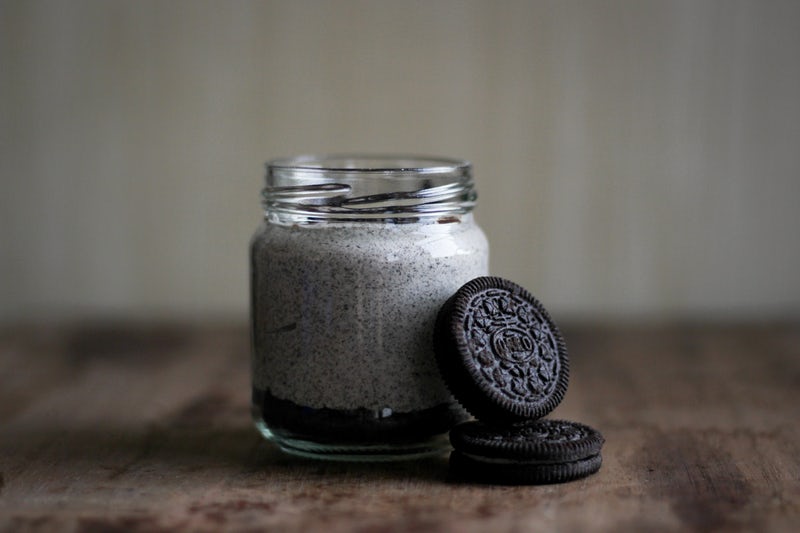Like many folks with drinking problems, my first addiction was sugar. I actually recall the horror of losing my grip on a Cookies and Cream ice cream cone when I was three years old at Baskin Robbins. I was devastated, watching that perfectly good scoop of fresh ice cream hit the ground and turn into a goopy mess on the floor. I also recall hiding in the closet every Halloween so I could polish off my plastic pumpkin full of bite-sized Snickers, Three Musketeers and Mars Bars. My parents always warned me that I’d get sick if I ate too much candy, but that just never happened. To this day, my tolerance for sugar is about 10 times that of the average person.
Though I’ve managed to shelve the alcohol and the cigarettes, the sugar problem persists to this day. I’ve tried quitting altogether, but no matter how many times I hit an OA meeting, I just can’t give it up. Apparently, I’m not alone; a former AA sponsor who managed to rack up 30+ years of both sobriety and smobriety couldn’t quit the sugar either. She tried over and over and over, but she just couldn’t resist her cravings for Sees Candies suckers.
I’m sure one of the main reasons I can’t call it quits with sugar is that it never destroyed my life like alcohol. Sure, I sometimes have bad sugar hangovers, but thankfully the problem isn’t so bad that I binge on the stuff day after day after day. If I do have a sugar coma, it’s just a few days out of the month. I wish I could have iron self-control, like so many people you run into at 12-step meetings in LA who don’t consume caffeine or sugar or dairy or gluten or fructose or anything made from animals, but I’m just not willing to exert any more energy in quitting anything. Is it really that bad if I overdo it on Oreos?
Still, sugar is pretty gnarly, and gaining weight from stuffing my face with doughnuts all day is the least of my concerns. Though I wouldn’t be happy about going up a size or two, my main worry is that weight gain can bring on diabetes and insulin resistance. Diabetes in itself is bad enough, but the disease may trigger early-onset dementia and Alzheimer’s. No thank you. Then there’s the horrifying effect sugar has on my brain today; it messes with both my focus and my mood, and at times it can even trigger bouts of rage.
About a year ago, I made the mistake of scarfing down a box of Oreos with milk before bed and on a relatively empty stomach, and when I woke up in the morning I was convinced, for no reason whatsoever, that my boyfriend didn’t love me or pay enough attention to me. So, I proceeded to call him to tell him so, and when he didn’t pick up, I called multiple times, something I never do, until he finally picked up.
He answered with a quizzical “Are you okay?” With my body in a state of mild convulsion, I realized that no, I was not okay. I was in the midst of a sugar withdrawal only slightly less acute than the withdrawals I experienced from alcohol. What’s worse is that this ended up happening a second time, about a month later. Sugar, apparently, had the power to make me certifiably insane.
After these horrible occurrences and two tearful apologies to my boyfriend, I decided I really needed to take the sugar addiction seriously. But I’d already tried to quit so many times, and I just didn’t want to go through the agony of withdrawal only to give in again.
Then I remembered that a few weeks earlier I was out at a nice meal and ordered some blueberry beignets with vanilla ice cream on a full stomach, and I didn’t even finish them! The irresistible craving that I typically develop when eating something sweet on an empty stomach just didn’t surface. The same thing happened with alcohol; I rarely got blitzed while drinking at dinner, and even if I had a lot to drink usually just got sleepy and went to bed. Since I didn’t need to shovel down five beignets, I didn’t suffer from a sugar hangover or blood sugar imbalance.
Upon remembering this, I made a rule with myself that I wouldn’t have sugar unless it was on a full stomach. I’d let myself eat an entire package of Oreos if I wanted, as long as I’d already scarfed down plenty of protein and fiber.
The rule seems to be working.
Right now I’m in Armenia, my mother country, and this place has more Oreos than any other country outside of the US, so I’m beginning to believe my sugar addiction is genetic. You can find white chocolate and milk chocolate-covered Oreos, Brownie Oreos, Oreo Thins, and they even sell Oreos by the kilo.
I don’t resist buying these. Instead, I just cook up some chicken with eggplant, or eat some yogurt and lavash, and top it all off with olives and then chase whatever I just ate down with water and wait a good 20 minutes before allowing myself to eat the cookies. By the time all that food registers to my brain, I just don’t have the physiological desire to stuff my face with the cookies. I’ll end up eating maybe four or five of them (it’s a lot for some folks, but that’s nothing for me), and then putting the box away.
As a result, I don’t wake up out of my mind and in a rage at the world, and I don’t get all shaky and cracked-out and suffer from an inability to focus. For now, it’s a doable, harm-reductive approach that will hopefully help me stave off early-onset dementia, diabetes, and even an expanding waistline as I grow old.



